
The work of a sports referee or umpire can be particularly thankless. You're not likely to be praised for making a good call, but making a bad one -- especially when caught on instant replay or during a big game -- can bring the wrath of players and fans. So how do officials deal with the criticism that comes after a botched or controversial call? Here are five top refs and umps who found ways to move on from an official's worst nightmare.
'WE ARE ALL HUMAN'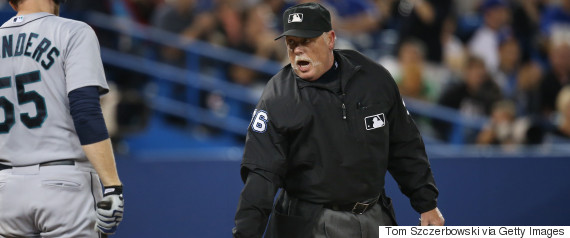
Jim Joyce is one of Major League Baseball's most respected umpires, but he's never fully recovered from a bad call he made in 2010. Facing the Cleveland Indians, Detroit Tigers pitcher Armando Galaragga was one out away from a perfect game. Galaragga fielded a grounder and stepped on first -- and even started to celebrate -- but Jones called the runner safe, despite the fact that instant replay showed he was out.
Within hours, Joyce's life had changed. Fans chastised him, death threats poured in and Joyce suddenly found himself contemplating a legacy he wanted no part of. "I don't want to be known as Jim Joyce, the guy that blew the perfect game," he told ESPN. "But I think that's inevitable. Because I'm Jim Joyce, the umpire who blew the perfect game."
How did he move on from his highly publicized gaffe? Partly by embracing the many emails and letters -- some nice, some nasty -- saved by his wife, Kay. But he also made a point to apologize directly to Galaragga, who graciously told Joyce, "We are all human."
'I DON'T THINK YOU GOT IT RIGHT'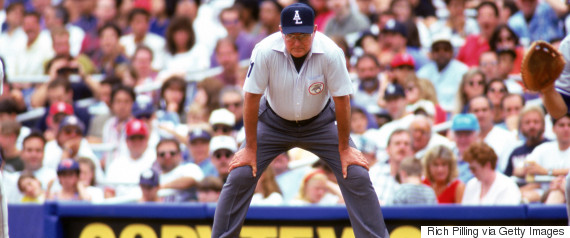
Though he spent nearly three decades as a MLB umpire, Don Denkinger's career is defined by a single moment. During the 1985 World Series, the St. Louis Cardinals were three outs away from winning Game 6 and clinching the title. The batter leading off for their opponent, Kansas City, hit a ground ball. Although the player was clearly out, Denkinger called him safe, and the Royals went on to win games 6 and 7 to emerge as World Series champions.
After Game 6, Denkinger spoke to Peter Ueberroth, the commissioner, in the dressing room. "I immediately asked him if I got it right or wrong," Denkinger later remembered, "because up to that point I didn't know. He said, 'No, I don't think so. I don't think you got it right.' You just get that sick feeling."
The antipathy was intense: Denkinger got hundreds of letters brimming with anger and threats. But like Joyce after him, Denkinger also received messages of support from around the country. Letters poured in, as did acts of kindness, such as a limousine driver offering free rides. Perhaps most meaningfully of all, in 1995, the Cardinals organization invited Denkinger to its 10-year reunion banquet.
'IT IS A PART OF BASEBALL HISTORY'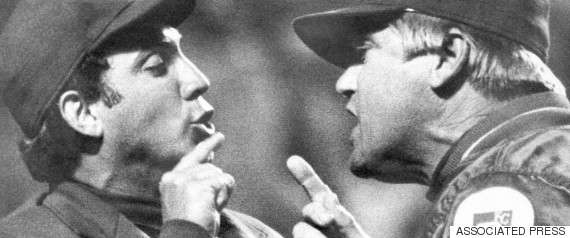
In Game 1 of the 1995 American League Championship Series between the New York Yankees and Baltimore Orioles, Yankees shortstop Derek Jeter (above, left) hit a deep fly ball to right field. Jeffrey Maier, a 12-year-old Yankees fan, reached out and deflected the ball before the right fielder could get to it, and umpire Rich Garcia (above, right) incorrectly ruled the play as a home run rather than fan interference. The Yankees went on to win the game, the pennant and, ultimately, the World Series.
Garcia says he never saw the ball hit Maier's glove. In the years since, he's moved on from his mistake. "It has come to the point where it does not bother me," he said in 2012. "It is a part of baseball history and that is what baseball is all about. I have dealt with it. I have said what I have had to say."
'WHEN WE MAKE MISTAKES, YOU GOT TO STEP UP AND OWN THEM'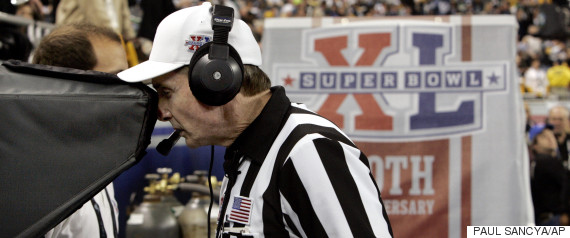
No sporting event, or refereeing gig, is bigger than the Super Bowl -- and in Super Bowl XL, the 2006 game between Pittsburgh and Seattle, lead official Bill Leavy made at least four bad calls. The Steelers won that game 21-10 after Leavy called back a Seahawks touchdown in the first quarter and a huge passing play that brought the Seahawks down to the 1-yard line in the third quarter. Leavy would also tell a reporter years later that he botched two calls in the fourth quarter, although he didn't specify which ones. There's a good chance, though, that Leavy was thinking in part about the moment where he inexplicably called Seattle quarterback Matt Hasselbeck for an illegal low block on a tackle that was, in fact, legal. On the ensuing drive, Steelers wide receiver Antwaan Randle-El threw the game-sealing touchdown pass on a trick play to Hines Ward.
At Seahawks training camp four years later, Leavy said: "It was a tough thing for me. I kicked two calls in the fourth quarter and I impacted the game, and as an official you never want to do that. It left me with a lot of sleepless nights, and I think about it constantly. I'll go to my grave wishing that I'd been better... I know that I did my best at that time, but it wasn't good enough... When we make mistakes, you got to step up and own them. It's something that all officials have to deal with, but unfortunately when you have to deal with it in the Super Bowl it's difficult."
The good news for Leavy -- a retired San Jose police officer and firefighter -- is that he continues to work for the league as a lead official. His 20-year tenure as an official puts him in rarefied company.
'OFFICIALS STRIVE FOR PERFECTION -- I FAILED MISERABLY'
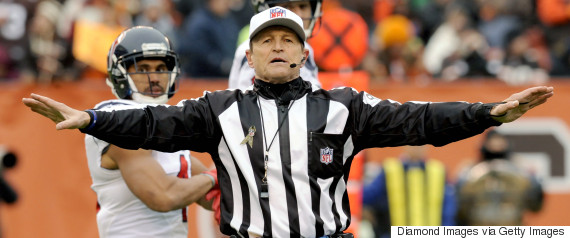
During a September 2008 NFL game between Denver and San Diego, Broncos quarterback Jay Cutler fumbled and the ball was clearly recovered by the Chargers. Official Ed Hochuli, however, incorrectly ruled the fumble an incomplete pass. He was then unable to give the Chargers the ball even after instant replay, because he had blown the play dead.
The gaffe resulted in a barrage of hate mail, but Hochuli found solace and even some catharsis by actually responding to the nasty emails. "People deserve a response," he said a few days after the game. "You can rest assured that nothing anyone can say can make me feel worse than I already feel about my mistake on the fumble play. You have no idea... Affecting the outcome of a game is a devastating feeling. Officials strive for perfection -- I failed miserably. Although it does no good to say it, I am very, very sorry."
Email me at jordan.schultz@huffingtonpost.com or ask me questions about anything sports-related at @Schultz_Report, and follow me on Instagram @Schultz_Report. Also, be sure to catch my NBC Sports Radio show "Kup and Schultz," which airs Sunday mornings from 9 to 12 EST, right here.
